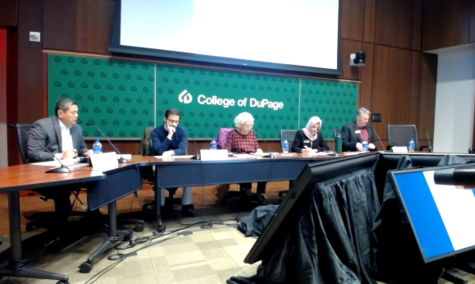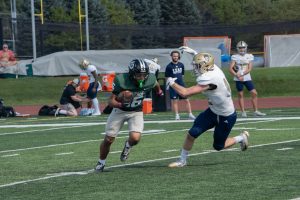Provost Plans for Students’ Academic Success
The Student Success Committee discussed its plans to raise student success based on the provost report of low course completion rates among COD students.
October 17, 2022
A member of the provost’s Completion Committee, Dr. Mark Curtis-Chavez, presented the provost’s data report on COD student’s academic completion rates, during the Oct. 13 meeting on-campus. 53% of students leave COD after their first semester. He went on to show a chart that out of all students taking a COD course, 22% will graduate with a degree and certificate. Similarly, students dropping out of classes lower the completion rate.
The provost’s Completing Committee and the Board of Trustees’ Student Success Committee are concerned with raising these completion rates. The Committee discussed student success, in terms of the students completing or graduating with the degrees or certificates they choose. They have been working to increase these for the past few years and are currently formulating new initiatives with the provost’s Completing Committee.
“Student success is realized through the articulation of their goals, appreciation of their life circumstances and assessment of their academic preparedness,” said Florence Appel, the Trustee Chair who was present at the meeting.
COD Student Trustee Ayesha Shafiuddin described the importance of guiding students through their program to completion.
“Completion is helping students get on their pathway from the beginning, to get their degree or certificate,” Shafiuddin said. “Then, they have that credential to continue in their life and to be successful.”
Dr. Curtis-Chavez described effective measures that other community colleges have done to increase their completion rate. To start, they examine student grades in specific types of courses. One type is gateway courses, which must be passed for students to proceed to a higher level course in the program. They will determine the aggregate pass and fail grades in these courses.
“Then, we’re going to ask faculty to create initiatives to help us improve those courses.” Dr. Curtis-Chavez concluded.
It is important to collect this data while courses are in session, so that it can be acted on before the students possibly drop out or fail the class.

Another initiative is called Big Bets, which is based on the model from the Alamo Community Colleges District. If adopted to COD, it would include measures such as no more late registration for classes. Also, math and English would have to be co-requisites in the first semester.
Besides the Big Bet changes, there are other macro-level changes that the Completion Committee will recommend to the provost.
“They will develop the process for vetting and budgeting for department-level intervention proposals,” Dr. Curtis-Chavez said.
Some of these initiatives have already been put into action and benefited students. These include the Guided Pathways program, open education resources, and tracking midterm quarter grades.
“We’ve saved students in the past two years, $3.1 million through our mental health services and our equity plan.” Dr. Curtis-Chavez said.
Dr. Curtis-Chavez acknowledged that students are central to how COD makes decisions on how the institution should run.
“We must create a sense of belonging for our students,” Dr. Curtis-Chavez said. “Data has shown that when a student feels like they are part of the institution or that they’re cared for, those students are successful.”
That’s why it’s important to prioritize their feedback and concerns on what the Student Success Committee may do. At the meeting, Shafiuddin mentioned the importance of active student voices being involved with all the steps of the Committee’s plan. As Student Trustee, she further encouraged students to communicate with her at SLC meetings or the monthly Board of Trustee meetings.
“Students can directly email me too, at [email protected] or my board of trustees’ email, as well.” Shafiuddin said. “Once students have the chance to review these meetings, they can also come to the committee meetings themselves.”
One such student, Zohaib Quadri, attended the recent Student Success Committee meeting as a member of the public. He shared his reflections on how their goals can benefit students who need guidance.
“I am a freshman at COD working hard to get my degree in engineering science. Before I began, I was completely clueless about what classes to take, how to get enrolled, when and how to transfer.” Quadri described, “[The Guided Pathways program] is intended to help clueless, disorganized students like myself figure out the goals of their academic journeys. Being given the chance to receive a personal guide from people who are committed to your growth and success is something I find very valuable.”
To hear more about the Student Success Committee’s plans, past live streams can be viewed on the Board of Trustees page on the COD website. Next week’s Board of Trustees meeting is also open to the public, so students can provide input on what direction the committee should take.




















